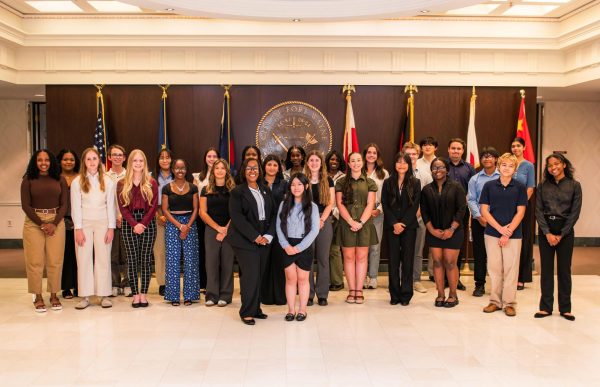Cheating lures students into darker path
Two students at the same table portray the act of cheating. Cheating can become a simpler way to get decent grades, but damages the learning process.
“Cheating is a form of self-deception. We go to school learn. We cheat ourselves when we coast on the efforts and scholarship of others”-James E. Faust
Continuous efforts are made to discourage students to stop cheating. Nothing has seemed to permanently stop the flow of cheating from occurring no matter how harsh the punishment is for it.
There is no one reason for cheating. All people are different and with those differences comes non-aligning motives. One reason for cheating would be the assumption that the school-work they’ve been assigned is invaluable to their education.
Unnecessary work takes away for the time they could be putting into other projects, assignments, or even personal time. Next, there is the exact opposite problem. The assignment is essential to a student’s education. Failure may cost them significantly. An extreme amount of pressure consumes students. Some students would rather cheat the system to ensure success.
No matter the reason, students cheat for their own benefit. Students however often know cheating is immoral as according to Dr. David Rettinger in “Why Students Cheat-and What to Do about it” said that they cheat just enough to maintain a self-concept as an honest person. They make their behavior an exception to the general rule.
Students may be able to justify cheating, but the school never will.
“Carroll High School believes that cheating deprives students of the learning experience,” Mr. Micah Lackland, assistant principal said.
Mr. Lackland says nothing excuses cheating and whatever justification a student comes up with is only an attempt to deflect blame.
“If a student is stressed they can go to someone for help. They still broke the rules and must be punished for said actions,” Mr. he said.
This opinion also is shared by students.
“Students justify it but it’s never really justifiable,” Senior Ben Smith said.
But Ben also admitted that he would not turn in a fellow student or a friend for cheating.
Realistically, cheating will never be completely eradicated. It is simply a way to get what a student desires without putting any effort in.
“A student will eventually fall into the pit-trap of cheating,” Mr. Lackland said. “What truly matters is if they continue on this path or not.”
hat matters most when it comes to cheating is that students stop feeling the need to do so. If students pursue college, the punishments for cheating are much less lenient than they are in high school. At best, a student caught inadvertently plagiarizing could get a failing grade on an assignment. At worst a university could expel or even be charged with Academic Fraud.
“Students all have the potential to become successful and better versions of themselves. All cheating does it stop that process from taking place,” said Mr. Lackland.


